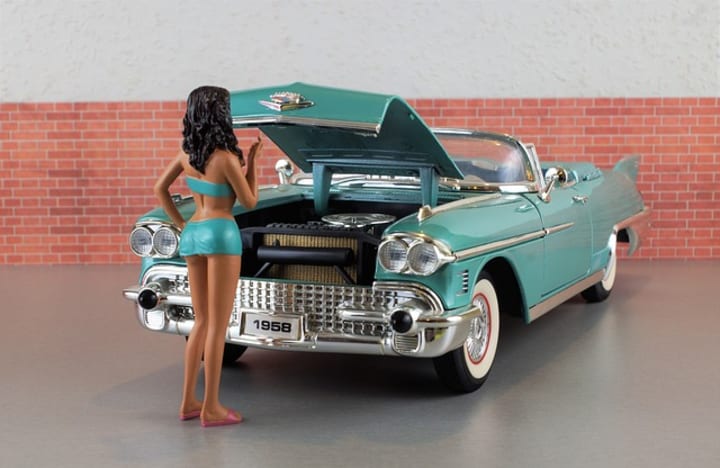
In 2005, an article regarding the importance of visual input vs auditory input in relation to spatial information gathering came out of Stanford University School of Medicine’s Department of Neurobiology. I hope that sentence was as fun to read as it was to write. To get us started on this topic, I want to throw a vocabulary term at you: visual capture. In the aforementioned article, visual capture is described as:
Our localization of a stimulus based on nonvisual information is ambiguous or conflicts with visual localization of the same stimulus, [leading] our nonvisual percept of location to sometimes draw to the visually identified location.
Break it Down

Maybe the longer she looks at it, the more it will make sense.
This article that I keep blabbing about is called “Why Seeing Is Believing: Merging Auditory and Visual Worlds.” In it, the authors state that scientists traditionally attribute the dominance of visual capture as reflecting an inherent advantage. The article argues this:
Visual capture occurs not because of any inherent advantage of visual circuitry, but because the brain integrates information optimally, and the spatial information provided by the visual system happens to be the most reliable.
That’s not to say visual input is always dominant. Optimization is the key point the authors are trying to make, so while visual input is optimal for spatial information, auditory input is optimal for temporal processing.
The authors give a simple, explanatory description of visual capture of auditory space. The short paraphrasing of it is this: If you’re sitting in front of the TV watching a poorly dubbed movie, it’s likely that by the end of the movie you will perceive a synchronization of what you’re seeing and what you’re hearing. The longer this auditory misalignment goes on, the greater the chances that your brain will sync the audio to the visuals for you. So, why are we syncing information by what’s on the TV screen instead of what’s coming from the speakers?
“The reason that visual information should dominate space perception,” the authors explain, “can be appreciated intuitively: visual spatial information is exceptionally reliable and precise.” **I just want to note that this is likely less true for the visually impaired.** Because visual input is generally more reliable where spatial information is concerned, it becomes the favored (and overriding) input format.
The authors of this article conclude that there are two possibilities for visual dominance in spatial information:
The brain could have evolved to depend more heavily on visual stimuli than on auditory stimuli, regardless of the stimulus conditions, or the brain might weigh information in proportion to its reliability and integrate it in a statistically optimal manner. Results from psychophysical studies support the idea that perception, at least, uses the latter strategy.
Speaking of perception…
Our Sensations may Seem Accurate; Our Perceptions are not

It really depends on what was in the glass to begin with.
In a special edition of Scientific American, Sharon Guynup wrote an introduction about how illusion distorts our sense of perception. After learning how vital visual input is, this seems pretty acceptable. Guynup explains that, “Our brain—not our eyes—is the final arbiter of ‘truth.’ We are wired to analyze the constant flood of information from our senses and organize that input into a rational interpretation of our world.”
Illusion disrupt this process. Two of the contributors to the special Scientific American issue, Susana Martinez-Conde and Stephen L. Macknik explain: “It is a fact of neuroscience that everything we experience is a figment of our imagination.”

Nope, I can't see you.
So, if we perceive truth from the optimal stimulus input mechanism, but our perceptions are not accurate, on what do we rely? What is an illusion, and what is simply misaligned information?
About the Creator
RJ Plant
RJ Plant is a Birmingham, AL, native currently terrorizing Williamsburg, VA. She writes sci-fi and fantasy with thriller elements and has a fantastic library, as well as a strange love for science. Want more? Visit rachaelplant.com.






Comments
There are no comments for this story
Be the first to respond and start the conversation.